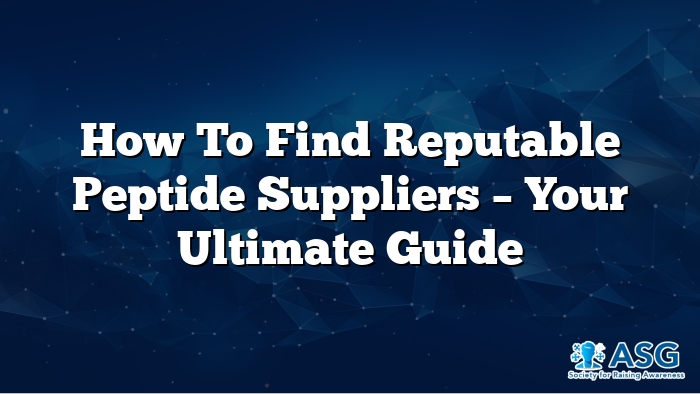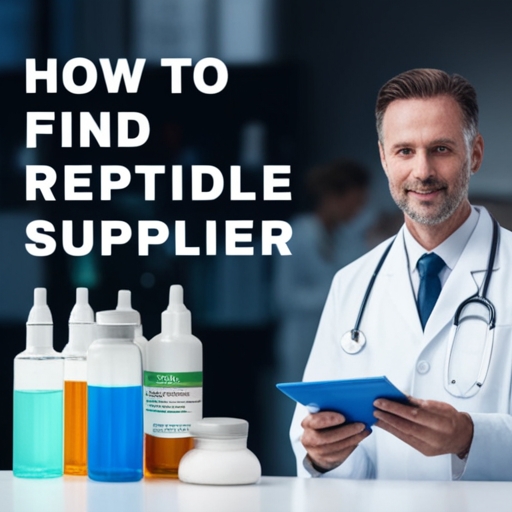How to Find Reputable Peptide Suppliers – Your Ultimate Guide

Peptides have become increasingly important in various fields, from scientific research to medical treatments and cosmetic applications. As short chains of amino acids, these versatile molecules play crucial roles in numerous biological processes. Understanding peptides and how to choose the right supplier is essential for ensuring quality and efficacy in any peptide-related endeavor.
What Are Peptides?
Peptides are composed of two or more amino acids linked by peptide bonds. They are smaller than proteins but perform similar functions, often acting as signaling molecules in the body. Peptides are involved in numerous biological activities, including hormone regulation, immune response, and cellular communication.
These molecules can be synthesized in laboratories or extracted from natural sources. Peptide synthesis involves creating specific sequences to target particular functions, allowing researchers and manufacturers to design peptides with desired properties. This versatility has led to their widespread use in research chemicals, pharmaceuticals, and cosmetics.
The Importance of Choosing the Right Peptide Supplier
Selecting a reliable peptide supplier is crucial for obtaining high-quality products. The right supplier ensures that you receive peptides that meet your specific needs, whether for research, medical applications, or cosmetic use. A reputable supplier adheres to strict quality control measures and provides the necessary documentation to verify the authenticity and purity of their products.
How to Identify Trustworthy Suppliers
Identifying trustworthy peptide suppliers requires careful consideration of several factors:
1. Look for suppliers with peptide certificates and peptide authentication credentials. These documents ensure that the supplier meets industry standards and regulations.
2. Check for peptide reviews and testimonials from other customers. Positive feedback indicates reliability and customer satisfaction.
3. Verify the supplier's reputation through peptide forums and online communities. These platforms often provide valuable insights from experienced users.
4. Ensure the supplier complies with peptide legality requirements in your region. This is particularly important for research and medical applications.
Key Factors to Consider When Choosing a Supplier
When evaluating potent

ial peptide suppliers, consider the following factors:
Peptide quality control: Ensure the supplier conducts rigorous peptide purity tests and peptide batch testing. These tests guarantee the product's quality and consistency.
Peptide storage and handling: Proper storage conditions are essential for maintaining peptide stability. Check if the supplier follows appropriate procedures and offers peptide reconstitution guidelines.
Peptide pricing: While cost is a factor, extremely low prices may indicate poor quality. Compare pricing across reputable suppliers to ensure you're getting a fair deal.
Peptide customer service: Responsive and knowledgeable customer support can make a significant difference in your experience with a supplier.
Common Red Flags in Peptide Suppliers
Be wary of suppliers exhibiting the following red flags:
1. Inconsistent or extremely low pricing
2. Lack of proper documentation, including peptide certificates
3. Negative peptide reviews or consistent complaints about product quality
4. Non-compliance with peptide regulations
5. Reluctance to provide detailed product information or analysis reports
Quality Assurance and Testing
Quality assurance is paramount in the peptide industry. Reputable suppliers conduct comprehensive peptide purity tests and peptide batch testing to verify the product's composition and purity. These tests typically include:
1. High-performance liquid chromatography (HPLC)
2. Mass spectrometry
3. Amino acid analysis
Suppliers should provide peptide certificates and detailed peptide analysis reports, confirming the product's quality and compliance with industry standards.
Customer Reviews and Testimonials
Customer reviews and testimonials offer valuable insights into a supplier's reliability. Positive feedback on peptide forums and online platforms often highlights:
1. Product quality and consistency
2. Efficient peptide shipping and handling
3. Responsive peptide customer service
4. Accurate product descriptions and information
Pay attention to recurring complaints about shipping delays, product inconsistencies, or poor customer support, as these can indicate potential issues with the supplier.
Regulatory Compliance and Certifications
Regulatory compliance is essential for peptide suppliers. Ensure they adhere to peptide regulations and industry standards relevant to your region and intended use. Look for suppliers with certifications from recognized authorities, which demonstrate their commitment to quality and safety.
Verifying a supplier's compliance with peptide legality requirements is crucial, especially when dealing with research chemicals or pharmaceutical-grade peptides.
Comparing Prices and Value
When comparing peptide suppliers, consider both price and value. While low prices may be tempting, they often come at the cost of quality. Evaluate the supplier's peptide pricing in relation to their quality assurance measures, certifications, and customer service.
Look for suppliers offering peptide discounts and peptide deals without compromising on quality. Some suppliers may provide bulk discounts or loyalty programs for regular customers.
Shipping and Handling Procedures
Proper shipping and handling are crucial for maintaining peptide integrity. Ensure the supplier follows stringent peptide shipping protocols, including:
1. Temperature-controlled packaging
2. Timely delivery
3. Discreet labeling for sensitive shipments
Check if the supplier provides tracking information and insurance options for valuable shipments. Reliable peptide delivery ensures the product arrives in optimal condition, ready for use or storage.
Return Policies and Guarantees
A clear return policy is essential when purchasing peptides. Look for suppliers that offer:
1. Satisfaction guarantees
2. Hassle-free returns for defective or damaged products
3. Clear terms and conditions for returns and refunds
A robust return policy reflects the supplier's confidence in their product quality and commitment to customer satisfaction.
Customer Support and Service
Effective customer support is vital for a positive experience with peptide suppliers. Look for:
1. Responsive peptide customer service
2. Multiple contact options (phone, email, live chat)
3. Knowledgeable staff who can address technical questions
4. Clear communication regarding orders, shipping, and product information
Good customer service enhances trust and can be particularly valuable when dealing with complex peptide orders or applications.
How to Verify Supplier Credentials
Verifying supplier credentials ensures reliability and helps you avoid potential scams or low-quality products. Consider the following steps:
1. Check for peptide certificates and industry affiliations
2. Research the supplier's reputation through peptide forums and online communities
3. Verify their compliance with peptide regulations in your region
4. Look for third-party certifications or quality assurance programs
5. Contact the supplier directly to ask about their credentials and quality control measures
Understanding Peptide Purity Levels
Peptide purity levels significantly impact product efficacy, especially for research and therapeutic applications. High-purity peptides are essential for accurate results and optimal performance. When evaluating purity:
1. Ensure the supplier conducts peptide purity tests
2. Request detailed peptide analysis reports
3. Understand the different purity grades (e.g., research grade, pharmaceutical grade)
4. Consider the intended use of the peptide when selecting purity levels
Higher purity peptides generally offer better results but may come at a premium price.
Peptide Storage and Handling
Proper peptide storage is crucial for maintaining product stability and efficacy. When purchasing peptides, consider:
1. Storage requirements (temperature, humidity, light exposure)
2. Shelf life of different peptide formulations
3. Peptide reconstitution guidelines provided by the supplier
4. Handling precautions for sensitive peptides
Some suppliers offer peptide vials with specialized coatings or packaging to enhance stability during storage and shipping.
Types of Peptide Products
Peptide suppliers often offer various product forms to suit different applications:
1. Peptide powders: Versatile and stable for long-term storage
2. Peptide solutions: Pre-dissolved for immediate use
3. Peptide vials: Convenient packaging for individual doses
4. Custom peptide synthesis services
Consider your specific needs and storage capabilities when choosing between these options.
Peptide Manufacturers vs. Resellers
Understanding the difference between peptide manufacturers and resellers can help you make informed decisions:
Manufacturers:
1. Directly synthesize peptides
2. Often have more control over quality
3. May offer custom synthesis services
Resellers:
1. Source peptides from manufacturers
2. May offer a wider variety of products
3. Prices can vary significantly
Both can be reliable sources, but working directly with manufacturers may provide more flexibility for custom orders and quality control.
Peptide Safety and Handling Precautions
Peptide safety is paramount, especially when dealing with research chemicals or bioactive peptides. Consider the following:
1. Always review safety data sheets provided by the supplier
2. Use appropriate personal protective equipment when handling peptides
3. Follow proper disposal procedures for unused peptides and packaging
4. Be aware of potential allergenic properties of certain peptides
Reputable suppliers prioritize safety and provide clear handling instructions with their products.
Emerging Trends in Peptide Supply
The peptide industry is constantly evolving. Stay informed about emerging trends, such as:
1. Increased focus on bioactive peptides for cosmetic and nutraceutical applications
2. Advancements in peptide synthesis technologies
3. Growing demand for custom peptide services
4. Expansion of online peptide stores and peptide marketplaces
Keeping abreast of these trends can help you identify new opportunities and stay ahead in your field.
Conclusion
Choosing the right peptide supplier is crucial for obtaining high-quality products that meet your specific needs. By considering factors such as quality control, regulatory compliance, customer service, and pricing, you can ensure a reliable and satisfactory experience. Remember to verify supplier credentials, understand purity levels, and prioritize safety when working with peptides. As the peptide industry continues to evolve, staying informed about emerging trends and best practices will help you make the most of these versatile molecules.
What are the most important factors to consider when choosing a peptide supplier?
Quality control measures, regulatory compliance, customer reviews, and pricing are crucial factors to evaluate.
How can I verify the purity of peptides from a supplier?
Request detailed peptide analysis reports and certificates of analysis, and ensure the supplier conducts regular purity tests.
Are online peptide marketplaces reliable sources for purchasing peptides?
While some online marketplaces are reputable, it's essential to thoroughly research the specific seller and verify their credentials before making a purchase.
